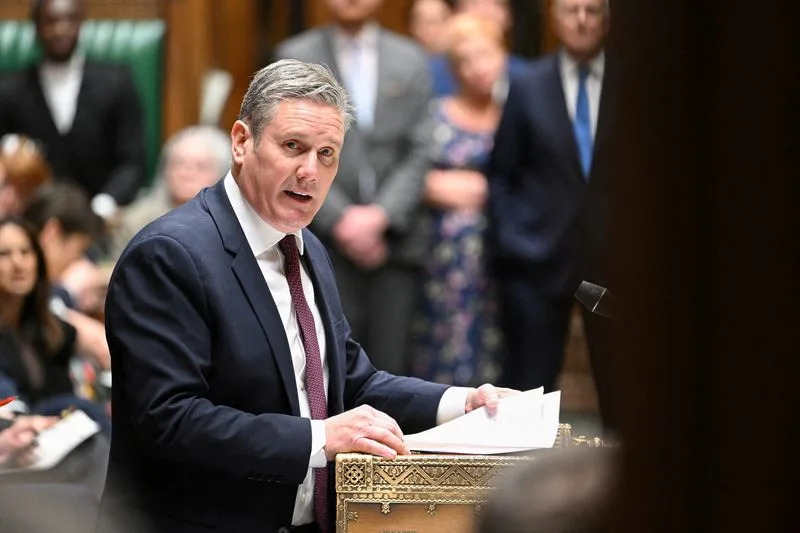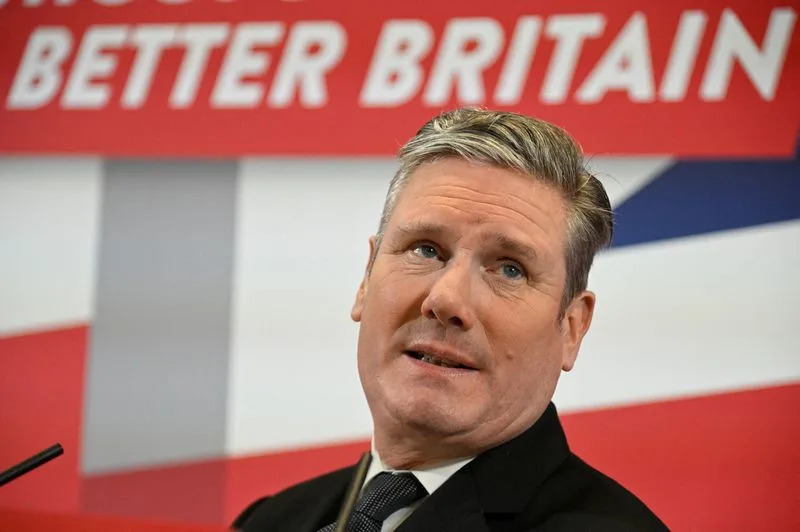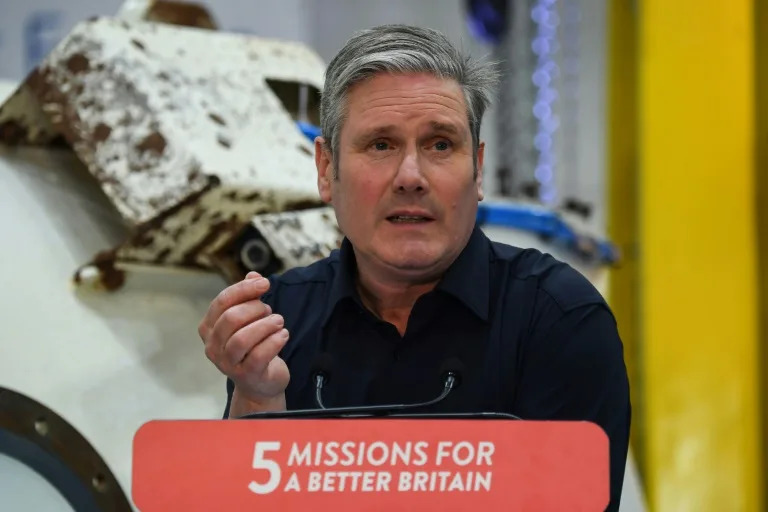Keir “Sir U-Turn” Starmer on the Skids

Photograph Source: Simon Dawson / No 10 Downing Street – OGL
In a few days’ time the Labour party will be celebrating the first anniversary of its landslide 125-seat victory in the 2024 UK general election.
For now though there seems little to celebrate. Keir Starmer and his equally unappealing chancellor of the exchequer/finance minister Rachel Reeves have led Labour’s lurch from one U-Turn to another virtually from Day One. This is indicative of at least 2 things: (1) deficient policy-making; and (2) political antennae so defective they can’t pick up the political equivalent of an exploding megaton bomb.
When Labour has been in power historically, the UK’s overwhelmingly rightwing media has been quick to throw the muddy and hysterical “tax and spend” label at it in the hope that it will stick (a move certain Democrats in the US– Zohran Mamdani in particular at this moment– will be thoroughly familiar with).
Anticipatory baulking at the likelihood of being called “tax and spenders” by the UK’s rightwing has pushed Starmer-Reeves into a corner.
Rather than taxing the rich to rescue a welfare system devastated by 14 years of Conservative austerity, a move consistently favoured in opinion polls, Starmer-Reeves have given paltry increases to a few welfare programmes while cutting several of the rest. They insist that their push for economic growth will create a supposedly prosperous UK that will then be able to fund a more ample welfare system. Understandably the public is not swayed by such nebulous imaginings about future “growth”.
Most of the Starmer-Reeves U-turns involve cuts to welfare that have had to be walked back. In the past month alone Starmer has U-turned on 3 occasions.
First, the government had axed in its 2024 Budget the one-time winter heating allowance of up to £300/$412 from 10 million pensioners, by turning what had been a universal policy into a means-tested one. The overall “savings” from this cruel measure were negligible, reflected in the U-turn’s cost of about £1.25bn/$1.70bn a year. It was Starmer’s holding out on rescinding this welfare cut for months, while committing to increased spending on defence to 2.5% of GDP from April 2027, rising to 5% of GDP in 2035, purely in order to conform to Trump’s diktat to NATO governments, that provoked the ire of Labour MPs. The increased defence spending will include bombers carrying nuclear weapons based in the UK for the first time since 1998— an obvious breach of the nuclear non-proliferation treaty. It was this abrupt military largesse that prompted his appalled MPs to pressure Starmer into making his U-turn on the winter heating allowance.
Starmer’s intransigence was said by his more diehard supporters to be a signal that Starmer-Reeves were prepared to be “tough” on limiting government spending, except of course when it came to the grovelling-before-Trump acquisition of new generation cyber weaponry.
Second, cuts were made to the Personal Independence Payments (PIP), which deprived 370,000 people of this support. The prospect of stroke victims unable to wash or dress themselves having budget cuts enacted on their backs was again too much for many Labour MPs—some of whom remarked pointedly that they did not enter politics to amplify the already wretched condition of the severely disabled. Also restored in this U-turn was the income of all those receiving the health element of Universal Credit, cuts which affected 2.2 million people.
In the short term, Starmer and Reeves need £5bn/$7bn “savings” a year to balance the books and avoid increased borrowing, pleading that they inherited a £22bn/$30bn fiscal “black hole” from the previous Tory government which Labour now has to fix. This “black hole” was not mentioned when Starmer announced the massive boost to military spending. The recently abandoned benefits cuts were however said at the time to be a vital part of the financial and social “reforms” needed to deal with the Tory fiscal incontinence inherited by Labour. The U-turns on these “reforms” will certainly incur increased borrowing and/or taxation in the government’s Autumn Budget. Starmer has deferred such decisions until that Budget is announced in a few months’ time (October to be precise).
Another U-turn by Starmer involved the decision to hold a national inquiry into the child grooming gangs which prey on vulnerable teenage girls in a number of northern English cities (the police jurisdictions of Greater Manchester, South Yorkshire and West Yorkshire were mentioned in a report by Baroness Louise Casey which highlighted significant institutional failures in protecting children from sexual predation).
For months Starmer had dismissed calls for a such a national inquiry, arguing the issue had already been examined in a seven–year inquiry led by Professor Alexis Jay. The matter is sensitive because the police had found a disproportionate numbers of men of Asian ethnicity (primarily Pakistani) among those arrested for group-based child sexual exploitation. The UK anti-immigrant far right is always willing to exploit such issues when it comes to stereotyping and marginalizing immigrant communities. Perhaps out of fear of being accused of racism the organizations tasked with protecting children at risk from predation did not take these data about two-thirds of offenders being Asian into account during investigations.
Louise Casey said in a later interview that the data should be investigated as it was “only helping the bad people” not to give a full picture of the situation, before she went on to say: “You’re doing a disservice to two sets of population, the Pakistani and Asian heritage community, and victims”.
Whatever his motives, Starmer’s delaying over the child exploitation scandal has done nothing to detract from the “too little, too late” image that has been pinned on to him. Starmer has sunk precipitously in opinion polls, with Labour losing a lot of potential voters to the far-right Reform UK led by Nigel Farage.
Starmer made his U-turns in the hope this would dissuade some of the 126 Labour MPs – about a quarter of the parliamentary party – who signed up to a wrecking amendment that could bring down the government’s Universal Credit and Personal Independence Payment Bill. A vote on the crucial second reading of the bill is due next Tuesday, and these MPs argue that the amended bill is still not good enough to merit their support. In particular they object to Starmer’s refusal to remove the two-child cap on child benefit imposed by the Tories when in power, and a restriction Starmer-Reeves place on the PIP allowance despite their U-turn, that is, the proviso that only those currently in receipt of PIP will benefit from its restoration—once Starmer’s bill becomes law, future PIP claimants will have their allowances reduced in line with the stricter eligibility rules of the originally intended bill. This results in what critics say will be an unjust two-tier welfare system based not on need but on the vagaries of time affecting the onset of one’s disability. Hence a quadriplegic parent disabled as a result of an accident on a construction site currently receiving PIP will benefit from the U-turn, but their child who becomes a quadriplegic from a car accident (say) after Starmer’s bill becomes law will suffer from the cut to PIP. Same disability, but discrepant benefit outcomes, so as the French would say: quelle justice!
Part of the blame for such chaotic stumbles are laid at the feet of Starmer’s Rasputin-like chief of staff, the Blairite Morgan McSweeney. It was McSweeney who masterminded Starmer’s coup in the party leadership race after Jeremy Corbyn’s resignation. It may be recalled that Starmer campaigned on upholding Labour’s election manifesto proposals (which were popular with the party membership) before dumping this commitment as soon as he was voted leader. McSweeney, behind the scenes, then orchestrated Starmer’s purge of the party’s social democrats. Quite simply: Starmer was campaigning on a false prospectus, in effect promising “Corbynism without Corbyn” before switching to outright Blairism when elected leader.
McSweeney was also one of the brains marshalling those Blairites who had sabotaged Corbyn at Labour HQ, after Corbyn came near to winning the 2017 general election, into his shadowy anti-left organization Labour Together. These Blairites had connived with a vicious rightwing-media character assassination of Corbyn, accusing him of antisemitism for being pro-Palestinian and being a former eastern bloc spy (even the BBC threw its weight behind the latter). But McSweeney found these Corbyn saboteurs to be good company in a move that matched any Trotskyite vanguardist infiltration of mainstream political parties.
Starmer, who is said by many who know him to have no real political convictions while red-hot with ambition, was not associated initially with McSweeney’s Labour Together. However Starmer, now on the verge of being a veritable Trojan Horse, was promoted by them to give the appearance of “continuity Corbynism” before espousing Blairism as soon as he was elected. This is amply documented in the book Get In: the Inside Story of Labour Under Starmer by Patrick Maguire and Gabriel Pogrund.
With the rise of Nigel Farage in the polls, seemingly at Starmer’s expense (Labour now has a 6-point poll deficit behind Farage’s Reform), Starmer has started to steal Farage’s racist and anti-immigrant electoral clothes, apparently at McSweeney’s instigation.
In May Starmer gave a speech about cutting immigration in which he said the UK risked becoming “an island of strangers” as a result of immigration. Starmer’s speech echoed the notorious “rivers of blood” speech delivered in 1968 by the anti-immigrant Tory MP Enoch Powell, a classics professor in a previous life, who referenced “the River Tiber foaming with much blood”, when voicing his feverish anxieties about immigration.
In typical fashion Starmer retracted his racist speech. In an interview published in the Observer newspaper Starmer said: “I wouldn’t have used those words if I had known they were, or even would be interpreted as an echo of Powell.
“I had no idea – and my speechwriters didn’t know either.
“But that particular phrase – no – it wasn’t right. I’ll give you the honest truth: I deeply regret using it”.
Oh dear, Starmer shows in these remarks how shockingly ignorant he is about the UK’s recent political history, and in any event he needs to give his speechwriters the boot, given that they were almost certainly drawn from the McSweeney operation.
The indication here is that Labour and Starmer are torn between 2 opposing electoral strategies.
On the one hand is the McSweeney approach designed to peel-off Labour voters who might defect to Nigel Farage. On the other is a broader strategy, said to be favored by the influential centre-right Labour minister Pat McFadden, which opts for an appeal to the national electorate instead of attracting those who might move to Farage in a general election.
For now the McSweeney strategy prevails with the ambitious leader lacking in political principles. However, if Labour continues to sink in the political ratings, its MPs may decide that Starmer is not up to the job. It is rumoured he’s been given a year to sort things out. Who knows what will happen, least of all the endlessly irresolute Starmer?
At the same time Labour lacks even the merest critique of capital, has no intention of deepening democracy by backing proportional representation, and refuses to take seriously the fucking of our planet as the despoliation of the environment and nature are given free rein.
Labour’s position is dire, and not just electorally. The only improvement for it on the horizon is getting rid of Starmer and his spectral eminence grise Morgan McSweeney.
Some of us who recall a better Labour still live in hope.









.jpg?crop=4:3,smart&auto=webp&quality=75&width=100)
